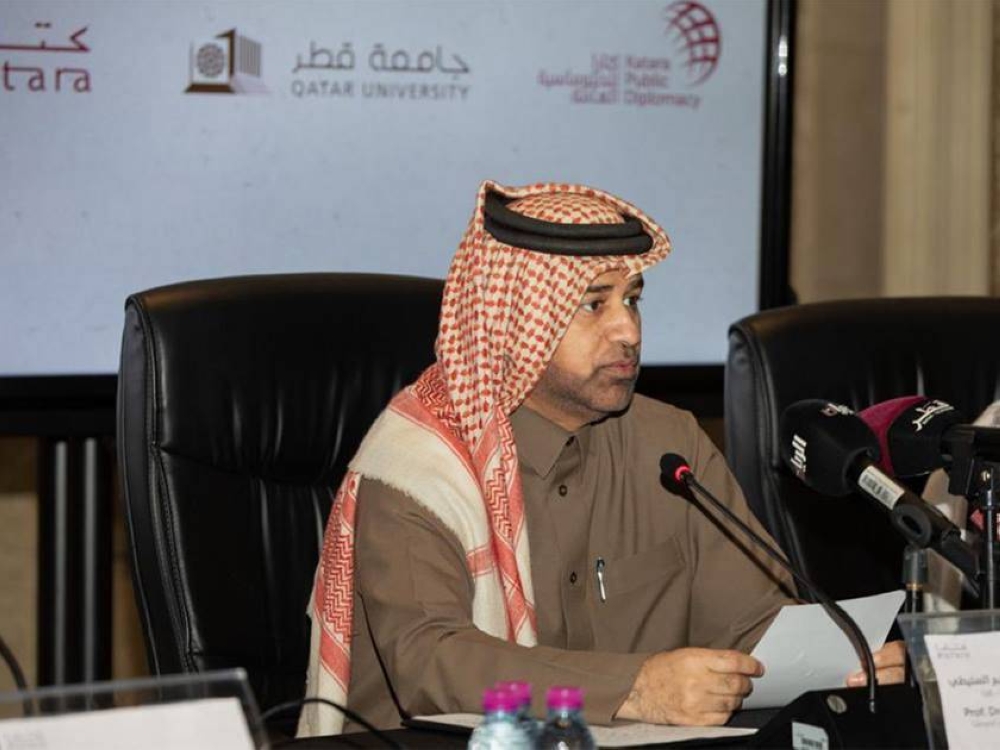Katara Cultural Village Foundation (Katara) represented by the Katara Public Diplomacy Center announced Sunday that it will host the conference "Public Diplomacy in the Arab Gulf States: Policies and Practices." from February 19-20, in cooperation with the Gulf Studies Center at Qatar University.
The announcement came during a press conference held Sunday with the participation of Katara General Manager and Head of the Global Public Diplomacy Network (GPDNet) Dr. Khalid bin Ibrahim Al Sulaiti, as well as Katara Public Diplomacy Center CEO Eng Darwish Ahmed Al Shaibani and Director of the Gulf Studies Center at Qatar University Dr. Mahjoob Zweiri, as well as a group of academics, researchers and media professionals.
Katara's General Manager said in his speech during the press conference that the Public Diplomacy in the Arab Gulf States conference will coincide with Katara's hosting of the GPDNet 8th General Assembly meeting and a wide academic participation of elite diplomats, researchers, academics and experts, representing the State of Qatar and 34 other countries.
Participants will present 35 studies and working papers discussing an array of topics, in a contribution to the advancement of public diplomacy in the Gulf countries, enhancing their role and practices of bringing societies closer together, contributing to development, and meeting the aspirations and interests of peoples.
For his part, Eng Darwish Ahmed Al Shaibani expressed his happiness that the conference will be an occasion for knowledge exchange, aiming to arrive at best policies and practices in the domain of public diplomacy in the Arab Gulf countries, noting that the conference will serve as an ideal platform to review the latest theories and concepts, and explore new horizons for public diplomacy in light of the rapid international updates and changes.
In turn, Gulf Studies Center Director Dr. Mahjoob Al Zweiri said that the conference will focus on Arab Gulf states' policies and roles in public diplomacy, including the State of Qatar, which established a world-renowned stature in the public diplomacy of various kinds.
Zweiri praised Katara's significant role through its wide-ranging and innovative activities.
Gulf Studies Center Director pointed out that the conference's management will work towards issuing a scientific book in English covering the conference and its discussions.
Zweiri also praised the partnership between Katara Public Diplomacy Center and QU's Gulf Studies center.
On the other hand, the Katara Center for Public Diplomacy at the Diplomatic Club organized a lecture entitled "Foreign Policy: Mediation and Peacemaking" by Dr. Mahjoub Al Zweiri, Director of the Gulf Studies Center at Qatar University.
During his lecture, Dr. Al Zweiri said that the essence of Qatari foreign policy and diplomacy is the human being, through its focus on basic issues, such as education, health services, and women's education, in addition to establishing infrastructure in many societies, and providing aid to countries, noting that the Qatari experience focuses on a basic theme that without building the state and making peace, economic development cannot be achieved.
He added that the Qatar has been able to assume its international position as an effective and reliable partner globally to face the challenges of the international community, and to impose itself as a key player capable of achieving understanding between the various parties and consolidating international peace and security, and this in itself crowns Qatar as a pivotal country in mediation, and a main address for peacemaking.
He pointed out that Qatar's foreign policy achieves national interests, international reputation, national security and economic prosperity, noting that Qatar has established a new school in the art of diplomacy within the context of the small country, relying on the accumulated experiences and successes of Qatari diplomacy, which was made locally, and cannot be achieved by any other country.
During his lecture, he reviewed the most important pillars of foreign policy, including non-interference in the internal affairs of states, consolidation of international peace and security, support for peoples' right to self-determination, and peaceful settlement of disputes.

